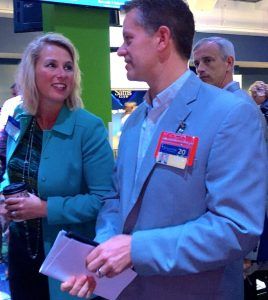Sam’s Club John Furner shares insights with suppliers, says digital a top focus
by October 12, 2016 5:24 pm 849 views

John Furner, Sam’s Club executive vice president and chief merchandising officer, said the biggest lessons the wholesale club might learn from Wal-Mart’s recent acquisition of Jet.com is how to target Millennials and encourage customers to put more in their online baskets.
Sam’s Club is a $60 billion retailer but is often left in the shadows of its big brother Wal-Mart Stores. Furner illustrated that point Wednesday (Oct.11) as the keynote speaker of the Bentonville Bella Vista Chamber WalStreet Breakfast held at Sam’s Club Home Office.
Furner said last week at the retailer’s investor conference he was talking with an analyst, and answering a question when the analyst spotted Jet.com founder Marc Lore and quickly followed after him. When asked how Lore might work with Sam’s Club, Furner said running Jet and Walmart’s global ecommerce business was enough to keep Lore busy for a while.
And while there are exciting technology initiatives at Walmart, it’s really Sam’s Club leading that charge inside the clubs, Furner said.
LEAD IN DIGITAL
Furner said a top focus for Sam’s Club is to lead in digital. The recently rolled-out Scan & Go in Sam’s Club has the potential to drive more overall sales simply because it’s changing the way people shop the club, he added.
Earlier this year Walmart moved to a scanning device in its test of Scan & Go in lieu of using a smartphone application. In Walmart’s Scan & Go test the shopper still has to go to register and scan the device code before leaving the store. Sam’s Club Scan & Go allows a member to scan the item with a phone and then skip the checkout line.
“Clubs have always been a great format for stock-up trips, but I am finding it’s very easy to run in and grab one or two items, scan them, go through the door check and be back to my car in five minutes. That is convenience shopping,” Furner said. “Our members love this app, it’s rated 4.5 stars in the app store.”

Sam’s Club recently rolled out the Scan & Go service nationally, with the exception of Puerto Rico.
SALESFORCE HELP
Growing membership is another focus for Sam’s Club. While Sam’s Plus members have been at the front of the retailer’s agenda, Sam’s recently partnered with Salesforce.com to gain business memberships. The Salesforce partnership is a way to help business members automate many of the membership functions from paper-based processes into a more flexible, digital model and enable more integration between physical and digital shopping experiences.
Sam’s Club announced in July it is using Sales Cloud as the foundation of its B2B business. This will allow for quicker automation of the wholesale chain to anticipate the needs of its business members, and more quickly remove cumbersome manual processes. Sam’s Club is also looking to connect the dots of its business members across every club by improving more visibility into the business member interactions with the help of Salesforce’s Analytics Cloud.
Furner said the Salesforce partnership is part of Sam’s Club efforts to digitally transform the overall business. He said club pickup for online orders is also widely used by business and plus members and this is being built into remodels and new clubs and is available in all the U.S. clubs. He said Sam’s Club also had success with its direct-to-home program that is a subscription based automatic replenishment system.
When asked about memberships industrywide being flat or down, while Amazon Prime nearly doubled memberships in recent years, Furner said there is always competition and retail is not soon going to get easier, regardless of what the economy does. He compared the changing retail landscape as a beast. He said Sam’s Club just has to stay out in front and outrun at least one of its competitors to keep from being eaten alive.
BETTER MERCHANDISING
Furner said the clubs live or die by the merchandise, because if shoppers aren’t compelled to come into a club they won’t bother with a membership.
Part of the Sam’s Club’s merchandising efforts has been to decentralize the buying offices. He said the regional buying office in Dallas is open and there are six buyers on the ground. He said they are using the Sam’s Club in Grapevine, Texas, as testing lab for new regional products adding items like frozen quail and more local salsa brands. He said it’s too early to tell what a localization strategy will do for the overall organization, but so far so good.
Another area Sam’s Club has been focused is reigning in the number of private labels offered. Over the past 18 months he said Sam’s has downsized from 19 private labels to the Member’s Mark brand which is working on packaging designs that go from “literal to lovable.” He said items that make it into Sam’s Club have to beat on price and value, with no exceptions.
Sam’s Club has pushed the bar higher in jewelry, fresh meats and apparel, Furner said. The company is also working with private label wines using the expertise of a buyer with almost 20 years in wine commerce in France. He said Sam’s Club buyers must be experts in their categories because the selection in clubs are narrowed to one or two choices per item so those choices must be right.
He was also in favor of more co-branding opportunities with suppliers in certain categories in which he said there has been positive traction with a few products. Furner also said the move away from standardized modular has been a good one. He said Club managers have the expertise to design their own layouts. In taking away the prescribed layout, Sam’s Club has been able to divert resources and people into the ongoing Member’s Mark branding work.
